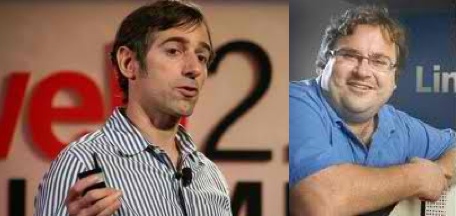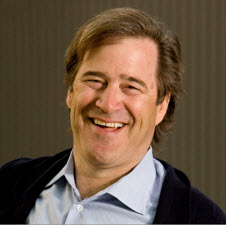 Zynga founder Mark Pincus (pictured far left) will benefit the most from his company’s planned initial public offering, according to Zynga’s SEC filing.
Zynga founder Mark Pincus (pictured far left) will benefit the most from his company’s planned initial public offering, according to Zynga’s SEC filing.
The company, the creator of massively popular social games like Farmville and CityVille, has yet to specify the price and number of shares for the offering. But the prospectus contains enough information on Pincus’ ownership stake for us to do back-of-the-envelope math on his pending worth, as well as that of other well-placed people at the company.
It’s widely believed that Zynga will push for – and receive – a valuation as high as $20 billion, pending any major upheaval in the markets in coming weeks or a sudden downturn in Zynga’s ability to maintain its popularity among gamers.
Pincus, the prospectus shows, will own 112 million shares, or about 18.1 percent of the company’s overall 618 million shares (see the details on this page). If the company does go public at a $20 billion valuation, that translates into a whopping value of $3.6 billion for Pincus’s stake.
AI Weekly
The must-read newsletter for AI and Big Data industry written by Khari Johnson, Kyle Wiggers, and Seth Colaner.
Included with VentureBeat Insider and VentureBeat VIP memberships.
That’s a significant milestone for Pincus, 45, who has long been an entrepreneur in Silicon Valley, but until now hasn’t enjoyed a grandslam. Pincus is known for his rapid-fire brainstorming of ideas. Earlier in his career, this personality seemed to exhibit itself in impatient bobs and weaves — for example, at early social networking company Tribe, where the company went through various incarnations, none of them very successful. For some, it suggested Pincus may not have sticking power.
But at Zynga, his ADD-like personality has become the perfect driver: If a game feature seems to work, Pincus runs with it. If it doesn’t, Pincus cans the idea, and moves immediately to the next one — an approach ideally suited for the fast-pace world of gaming innovation, where quick response to statistics, feed-back loops and other nuances of web engagement are critical.
The next big individual winner of the Zynga is Reid Hoffman (right in photo above), the founder of LinkedIn, and early investor in Zynga. Hoffman picked up 3.1 million shares of Zynga at about 5.6 cents in January 2008, before most other investors got into the deal. This now translates into about 0.5 percent of the company’s shares. But at a valuation of $20 billion, that’s a sweet $100 million. Of course, that’s just icing on the cake already enjoyed by Hoffman ($2 billion is the rough value of his stake in LinkedIn, the social networking company that went public in May).
 Another big beneficiary is the venture capital firm Kleiner Perkins, which invested shortly after Hoffman did, in July of 2008. By then, Zynga shares were valued at about 42 cents each. Kleiner’s 64 million shares translate into about 10.4 percent of the company today, giving it a stake worth around $2 billion should Zynga hit $20 billion in market value. The firm’s gaming specialist, partner Bing Gordon (pictured right), sits on Zynga’s board and takes much of the credit for the investment (he’ll be speaking at our MobileBeat–GamesBeat event in July.)
Another big beneficiary is the venture capital firm Kleiner Perkins, which invested shortly after Hoffman did, in July of 2008. By then, Zynga shares were valued at about 42 cents each. Kleiner’s 64 million shares translate into about 10.4 percent of the company today, giving it a stake worth around $2 billion should Zynga hit $20 billion in market value. The firm’s gaming specialist, partner Bing Gordon (pictured right), sits on Zynga’s board and takes much of the credit for the investment (he’ll be speaking at our MobileBeat–GamesBeat event in July.)
Again, this is all just “best-possible” math at this point, because under the IPO rules, investors and other inside shareholders are usually locked up for several months after the IPO, so they won’t be able can’t cash in for a while. The IPO filing does not specify how long the lock-up period will be.
Other winners include venture firms Institutional Venture Partners, Foundry, Avalon and DST, all of which invested around the same time as or later than Kleiner, but in smaller amounts. They each hold between 5 percent and 6 percent of the company, stakes worth about $1 billion each if Zynga does get valued at $20 billion.
 We’ll be exploring the most disruptive game technologies and business models at our third annual GamesBeat 2011conference, on July 12-13 at the Palace Hotel in San Francisco. It will focus on the disruptive trends in the mobile games market. GamesBeat is co-located with our MobileBeat 2011conference this year. To register, click on this link. Sponsors can message us at sponsors@venturebeat.com. Our sponsors include Qualcomm, Flurry, Greystripe, Nexage, Tapjoy, Fun Mobility, TriNet, Zong, Spil Games and WildTangent.
We’ll be exploring the most disruptive game technologies and business models at our third annual GamesBeat 2011conference, on July 12-13 at the Palace Hotel in San Francisco. It will focus on the disruptive trends in the mobile games market. GamesBeat is co-located with our MobileBeat 2011conference this year. To register, click on this link. Sponsors can message us at sponsors@venturebeat.com. Our sponsors include Qualcomm, Flurry, Greystripe, Nexage, Tapjoy, Fun Mobility, TriNet, Zong, Spil Games and WildTangent.
VentureBeat's mission is to be a digital town square for technical decision-makers to gain knowledge about transformative enterprise technology and transact. Learn More